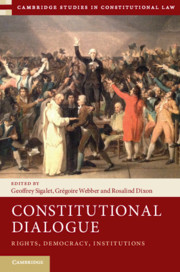Book contents
- Constitutional Dialogue
- Cambridge Studies in Constitutional Law
- Constitutional Dialogue
- Copyright page
- Contents
- Contributors
- Preface and Acknowledgements
- Note on the Cover Image
- 1 Introduction
- Part I Dialogue and Democracy
- Part II Dialogue and Institutions
- Part III Dialogue and Rights
- 8 Canada’s Notwithstanding Clause, Dialogue, and Constitutional Identities
- 9 Intra-Parliamentary Dialogues in New Zealand and the United Kingdom
- 10 Dialogue in Canada and the Dangers of Simplified Comparative Law and Populism
- 11 Bills of Rights with Strings Attached
- Part IV Case Studies of Dialogue
- Part V International and Transnational Dialogues
- Index
11 - Bills of Rights with Strings Attached
Protecting Death Penalty, Slavery, Discriminatory Religious Practices, and the Past from Judicial Review
from Part III - Dialogue and Rights
Published online by Cambridge University Press: 19 April 2019
- Constitutional Dialogue
- Cambridge Studies in Constitutional Law
- Constitutional Dialogue
- Copyright page
- Contents
- Contributors
- Preface and Acknowledgements
- Note on the Cover Image
- 1 Introduction
- Part I Dialogue and Democracy
- Part II Dialogue and Institutions
- Part III Dialogue and Rights
- 8 Canada’s Notwithstanding Clause, Dialogue, and Constitutional Identities
- 9 Intra-Parliamentary Dialogues in New Zealand and the United Kingdom
- 10 Dialogue in Canada and the Dangers of Simplified Comparative Law and Populism
- 11 Bills of Rights with Strings Attached
- Part IV Case Studies of Dialogue
- Part V International and Transnational Dialogues
- Index
Summary
- Type
- Chapter
- Information
- Constitutional DialogueRights, Democracy, Institutions, pp. 308 - 334Publisher: Cambridge University PressPrint publication year: 2019
- 1
- Cited by

